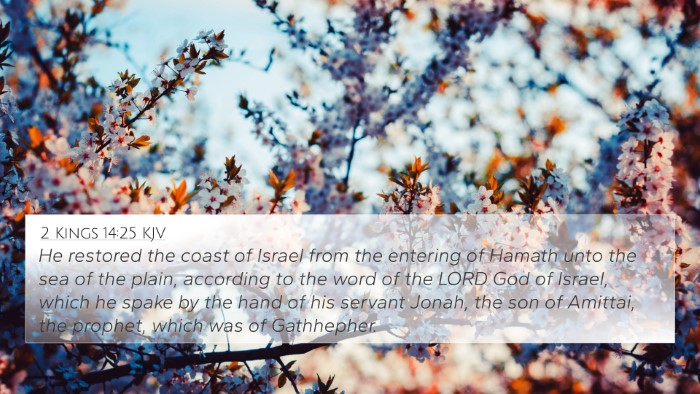Understanding 2 Kings 9:36
In 2 Kings 9:36, we encounter a significant moment in the narrative of the monarchy in Israel, specifically relating to the prophecy concerning Jezebel’s fate. The verse states,
"Therefore they came again, and told him. And he said, This is the word of the LORD, which he spake by his servant Elijah the Tishbite, saying, In the portion of Jezreel shall dogs eat the flesh of Jezebel."
Contextual Overview
This verse is part of a broader historical account that illustrates the judgment pronounced upon the house of Ahab due to their idolatry and wickedness. The declaration made by Elijah serves to emphasize God's authority
in executing justice upon the wicked.
Commentary Insights
-
Matthew Henry:
Henry underscores the certainty of divine judgment portrayed in this verse. He indicates that the prophecy is not merely a prediction but a definitive declaration intended to instill fear and awe regarding God's
ultimate control over life and death. The gruesome image of dogs consuming Jezebel’s body symbolizes complete disgrace and judgment.
-
Albert Barnes:
Barnes elaborates on the historical significance of the event, noting that this prophecy reflects God's justice towards Jezebel's numerous sins, including her role in leading Israel astray. The commentary places
emphasis on divine retribution, where not only physical destruction is foretold, but also a spiritual warning about the consequences of arrogance against God.
-
Adam Clarke:
Clarke provides a detailed analysis of the phrase "dogs shall eat the flesh of Jezebel," interpreting it as an indication of utter contempt. He points towards the social norms of the time, which held burial as
a significant aspect of dignity, and portrays Jezebel's fate as a complete stripping away of this dignity due to her vile actions.
Key Themes Explored
-
Divine Judgement:
The prophetic word serves as a reminder that God will execute judgment against the wicked. This reflects a recurring theme throughout the Bible regarding God's ultimate authority over justice.
-
The Role of Prophecy:
This passage highlights the importance of prophets in Israelite society as mouthpieces for God. The fulfillment of prophecy serves to validate the prophet's message and God's sovereignty.
-
Disgrace and Humiliation:
The imagery associated with Jezebel's demise serves to illustrate not only a physical punishment but a deep-seated humiliation of her character. It emphasizes God’s power to overturn social status and pride.
Cross-Referenced Bible Verses
- 1 Kings 21:23: A prophecy about Jezebel's future, reinforcing the message of divine judgment.
- 2 Kings 9:10: The prophecy concerning the fate of Ahab and his house forms a backdrop for understanding the necessity of this judgment.
- Revelation 2:20: This verse draws a parallel between Jezebel's behavior and the teachings that lead believers astray, reflecting the continuation of her legacy.
- 2 Chronicles 21:12-15: Discusses the impact of Ahab and Jezebel's reign on the kingdom and their legacy of sin.
- Jeremiah 34:20: The punishment of those who have set themselves against God, akin to the fate foretold for Jezebel.
- Matthew 10:28: Speaks about the fear of God who can destroy both body and soul, similar in tone to the judgment pronounced here.
- Proverbs 11:21: "Though hand join in hand, the wicked shall not be unpunished," reflecting the ultimate justice that God enacts regardless of human alliances.
Thematic Connections
The themes presented in 2 Kings 9:36 can be identified as foundational for various discussions across both Old and New Testaments. The connections between Bible verses enhance our understanding of God’s character and
His justice. Here are some overarching connections:
- Justice and Righteousness:
These themes echo in numerous scriptures, reinforcing the notion that God demands accountability from His people.
- Prophecy and Fulfillment:
This motif illustrates the continuity of God’s plan and serves as a critical element in the narrative of scripture.
- Idolatry and Consequences:
The consequences faced by Jezebel highlight the dangers of leading others away from God, a theme prevalent throughout the scriptures.
Conclusion
In conclusion, 2 Kings 9:36 is a powerful verse that encapsulates themes of judgment, prophecy, and the ultimate consequences of leading a life against God's will. By connecting it with multiple other biblical texts, we uncover
a rich tapestry of theological insights that emphasize God's sovereignty and the grave ramifications of sin. Understanding these connections through tools like a Bible concordance or a Bible cross-reference
guide can greatly enrich one's study of scripture.






